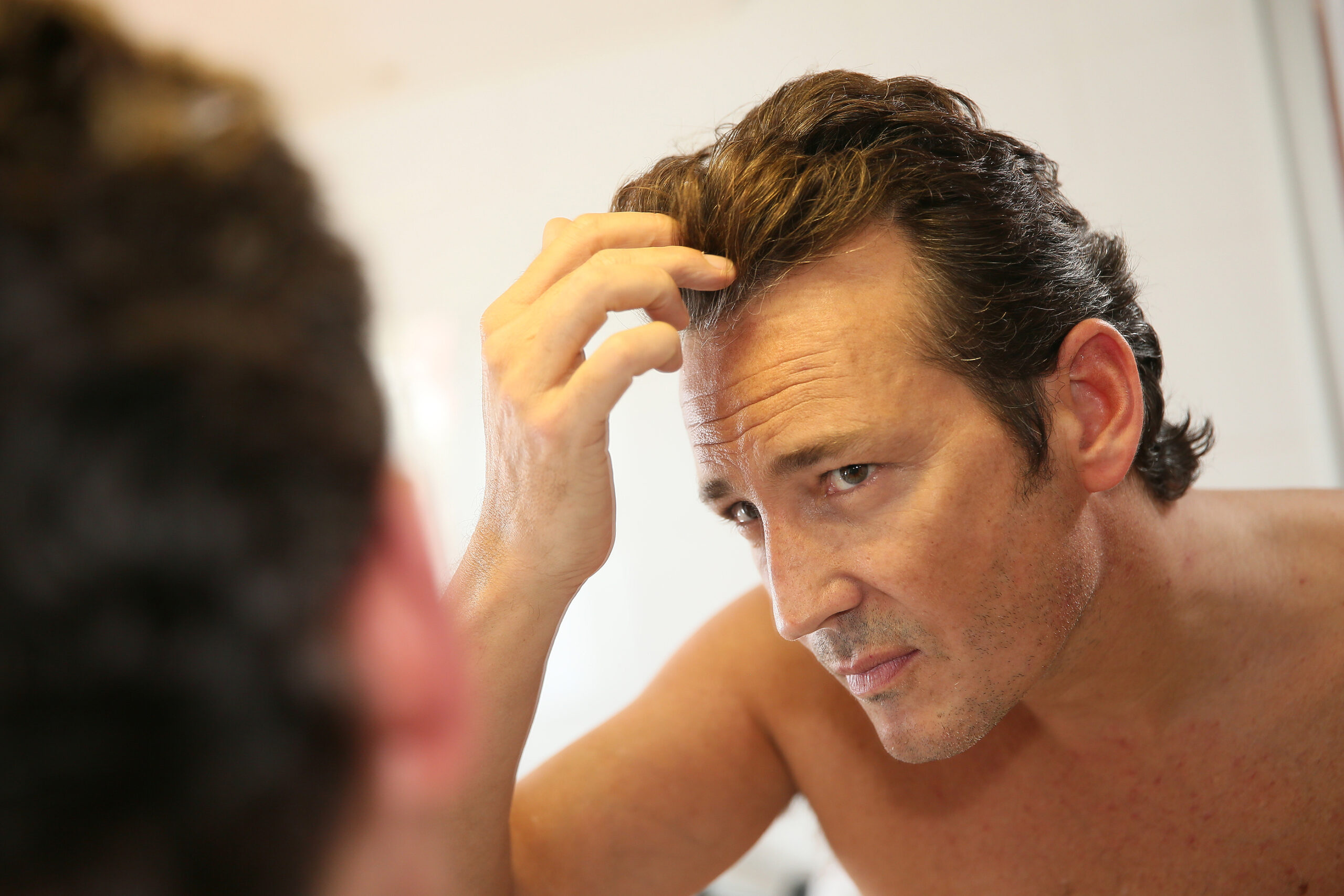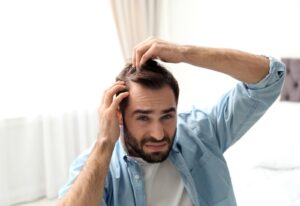Hair loss is a frustrating symptom sometimes associated with chronic illness. Whether you’re dealing with alopecia areata, telogen effluvium, or hair thinning due to conditions like lupus or thyroid disorders, the impact on self-esteem and quality of life can be significant. In this guide from Eldorado, we’ll take a look at various causes of hair loss related to chronic illness and some strategies for coping with the emotional impact.
Understanding Hair Loss in Chronic Illness
Hair loss associated with chronic illness can manifest in various forms, from gradual thinning to sudden severe shedding. Understanding the underlying mechanisms can help you cope with your condition and explore appropriate treatment options. Here are some common types of hair loss linked to chronic illness:
Alopecia Areata (Autoimmune Disorder)
Alopecia areata is an autoimmune condition characterized by the sudden appearance of round, smooth patches of hair loss on the scalp or other areas of the body. This condition occurs when the immune system mistakenly attacks hair follicles, leading to hair loss. While the exact cause of alopecia areata remains unknown, genetic predisposition and environmental factors are believed to play a role.
Telogen Effluvium (Stress-Induced Hair Loss)
Telogen effluvium is a type of hair loss characterized by excessive shedding due to a disturbance in the hair growth cycle. This condition is often triggered by significant physical or emotional stress, such as:
- Illness
- Surgery
- Childbirth
- Extreme weight loss
- Emotional trauma
- Severe infections
- Medications (e.g., chemotherapy, antidepressants, beta-blockers)
- Hormonal changes (e.g., thyroid disorders, menopause)
- Nutritional deficiencies (e.g., iron deficiency, vitamin D deficiency)
Telogen effluvium typically manifests as diffuse hair thinning rather than distinct bald patches and may resolve spontaneously once the underlying stressor is addressed.
Chemotherapy-Induced Alopecia
Chemotherapy drugs target rapidly dividing cells, including hair follicles, leading to temporary hair loss. This type of hair loss typically occurs within a few weeks of starting chemotherapy and may affect the scalp, eyebrows, eyelashes, and other body hair. While hair often regrows after treatment ends, the texture and color may change temporarily.
Androgenetic Alopecia (Hormonal Hair Loss)
Androgenetic alopecia, also known as male or female pattern baldness, is a hereditary condition characterized by gradual hair thinning and eventual baldness. Hormonal imbalances, particularly elevated levels of dihydrotestosterone (DHT), play a significant role in the development of androgenetic alopecia. While not directly linked to chronic illness, hormonal fluctuations associated with certain medical conditions can exacerbate hair loss in individuals genetically predisposed to androgenetic alopecia.
Scarring Alopecia (Cicatricial Alopecia)
Scarring alopecia is a group of rare disorders characterized by permanent hair loss due to inflammation and destruction of hair follicles. These conditions, which include lichen planopilaris, frontal fibrosing alopecia, and discoid lupus erythematosus, can result in scarring and irreversible hair loss. While the exact cause of scarring alopecia remains unknown, autoimmune reactions and genetic predisposition are believed to play a role.
Coping Strategies for Emotional Well-Being
Dealing with hair loss is frustrating. It can easily impact your self-esteem, body image, and overall well-being. While there’s no one-size-fits-all approach to coping with hair loss, a combination of practical strategies and emotional support can help. Here are some coping strategies to consider:
Seek Emotional Support
Don’t hesitate to reach out to friends, family members, or support groups who can provide empathy, understanding, and encouragement. Talking openly about your feelings and experiences can help alleviate feelings of isolation and empower you to face hair loss with resilience.
Explore Hair-Friendly Styling Options
Experimenting with hairstyles, hairpieces, scarves, or hats can provide a sense of control and creativity while concealing hair loss. Go for gentle styling techniques, such as:
- Avoiding tight hairstyles that pull on the hair follicles, such as tight ponytails, braids, or cornrows
- Using soft, fabric-covered hair ties or scrunchies instead of elastic bands
- Using wide-toothed combs or brushes with soft bristles
- Limiting the use of heat styling tools and opting for air-drying or low-heat settings when possible
- Choosing hair care products specifically formulated for fragile or thinning hair, such as volumizing shampoos, conditioners, and styling products
- Incorporating protective hairstyles, such as loose buns, twists, or gentle updos, to minimize friction and tension on the hair shaft
- Experimenting with hair accessories, such as headbands, clips, or hair wraps, to add volume and style without causing damage to the hair
Prioritize Self-Care
Investing in self-care is important for everyone. By dedicating time and energy to activities that promote relaxation, stress reduction, and overall well-being, you can nurture both your body and mind. Here are some self-care activities to consider incorporating into your routine:
- Meditation: Set aside time each day for mindfulness meditation or guided relaxation exercises to quiet the mind, reduce stress, and cultivate inner peace.
- Yoga: Practice gentle yoga poses and stretches to improve flexibility, reduce muscle tension, and enhance relaxation. Choose classes or online tutorials tailored to your fitness level and physical abilities.
- Exercise: Engage in regular physical activity, such as walking, swimming, or cycling, to boost mood, reduce stress hormones, and promote overall well-being. Find activities that you enjoy and make them a regular part of your routine.
- Spending time outdoors: Connect with nature by spending time outdoors, whether it’s going for a walk in the park, gardening, or simply sitting in your backyard. Fresh air, sunlight, and natural surroundings can have a rejuvenating effect on both body and mind.
- Creative expression: Explore creative outlets such as painting, drawing, writing, or crafting as a means of self-expression and emotional release. Engaging in creative activities can foster a sense of fulfillment, purpose, and joy.
- Healthy nutrition: Fuel your body with nutritious foods that support overall health and well-being. Prioritize a balanced diet rich in fruits, vegetables, whole grains, lean proteins, and healthy fats to nourish your body from the inside out.
Consider Professional Counseling
If feelings of sadness, anxiety, or depression persist, consider seeking professional counseling or therapy to explore coping strategies, develop resilience, and enhance self-esteem. A mental health professional can provide valuable support and guidance tailored to your individual needs.
The Role of Hair Restoration and Replacement Professionals
While coping strategies can help individuals manage the emotional impact of hair loss, seeking professional assistance from a hair restoration and replacement specialist is essential for finding the best hair loss treatment options and achieving your ideal results. Hair restoration professionals possess the expertise, experience, and resources to assess your unique situation, recommend appropriate interventions, and guide you through the restoration process.
Contact Eldorado Hair Restoration Center
At Eldorado, we understand the profound impact of hair loss on physical appearance, self-confidence, and overall quality of life. Our hair loss experts provide personalized solutions tailored to you. Whether you’re interested in hair transplant surgery, non-surgical hair restoration techniques, or custom hairpieces, we’re here to help you reclaim your confidence and restore a natural, youthful appearance.
Don’t let hair loss diminish your confidence and quality of life. Contact Eldorado today to book a free hair analysis and explore personalized solutions for hair restoration and replacement.





